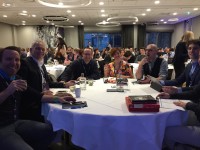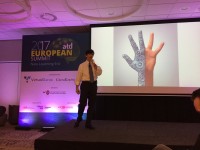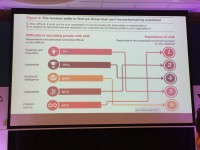Aggressive disruption impacts the competencies we need tomorrow
On December 13th the 1st European summit from ATD took place in Amsterdam titled "The new learning era". It was a good day with interesting discussions and insights about the impact of innovation on our lives and jobs. In this blogpost I am sharing with you what the keynote speaker Tony Bingham, CEO of ATD, talked about. I also make my personal reflection. Inspiring keynotes are great, but how do I translate these messages to a down to earth, day to day L&D job.
"Today is the slowest day of technology change in your life" (Jim Caroll)
Tony Bingham opened the summit with a keynote. He described how we currently are in the so-called 4th industrial revolution. Images of drones delivering UPS packages, Google implant lenses and smart pills that regulate their own doses once they entered your body filled the screen. A bit of science fiction to me. More of todays’ examples was the impact of 3D printing and smart cars. "Think about the potential this evolution brings to the way we live" he says. Bingham also reflected about innovation's impact to our workforce and jobs. "The disruption is aggressive", he continues. No way to escape. "Instead of spending time predicting…what are we going to do to prepare?". (I like this quote!)

Our brain physically suffers from pain when we undergo change.
Bingham continues arguing that competencies as creativity, innovation, leadership, emotional intelligence, adaptability and problem solving will become scarce in the future. Will your job still exist in the future the way you execute it today?
“The good news is: people can change!” he continues. “We managed to adapt to the 3 previous industrial revolutions since 1850, so why wouldn't we do so now?” The bad news is, that we don't like change; Bingham even stated –by showing a visual from some medical journal- that our brains are literally in pain when we undergo change. At that moment he got everyone’s attention in the room. I cannot say anything about the accuracy of this statement, but he made his point that change is not that obvious for human species like you and me.
"People tend to express the highest level of fear for things they're dependent on but that they don't have any control over, and that's almost a perfect definition of technology" (Christopher Bader-PHD, professor sociology)
At the end, Bingham sends out to a key message for L&D professionals by asking "how do you, L&D, make the organization feel comfortable in change? L&D has a role to play in creating a culture of change. Not in the future, but now. ATD recently released a report about culture and organizational change, which is available on their website.

Inspiring keynotes is one thing. But let’s talk about day to day reality
Ok, it was an inspiring keynote. Bingham got my attention during the whole ride. But I am not sure if drones will deliver my Amazon books next week and whether smart pills will be available at my pharmacy store next year. My day to day reality is different. Let's be honest.There are tons of books, articles and keynotes dealing with this topic. And many organizations I meet tempt to postpone taking radical steps nor to act now. To some degree I am one of them. But I have to confess that I, today, feel more and more challenged by innovation than ever before.
The rapid change and innovation: it's getting personal now
As Christmas gift my daughters asked for a Nintendo Switch to interactively play a game called ‘Just Dance'. Being a console dummy I was about to invest in one (An auch, I suddenly felt old when I got to the store without any knowledge about gaming-I am not even 40!). By coincidence we figured out that they can play the same game via Apple TV using an iPhone as the gear. No need to buy expensive consoles anymore! Too bad for the Nintendo sales team. their sales department and in the end...their coworkers.
Another example. My car GPS is not always trustworthy (we regularly have argues-LOL). Integration of iPhone apps (such as Waze and google maps) with your GPS screen via CarPlay(*), makes my car GPS I paid for useless. Next time, I will no longer pay for a GPS when buying a car. Innovation drives consumers to make other choices. As a result business models are challenged. So what about the impact on their coworkers, on HR, on you and me? Who is responsible to support change?
Innovation is not only about developing competencies and skills
Also professionally, I see how innovation changes jobs. It is coming closer than ever. Working as consultant in a media context, I daily see how innovation is shaking job requirements and competencies needed. An example. Solely producing linear radio and television is no longer enough.Talented and passionate men and women making great programmes on radio and TV are challenged to think and act more and more digital. And “digital” doesn’t mean copy/pasting radio content to the web. The context they are working in is changing dramatically and –because of the passion for their jobs- it is not easy to make the shift. They often argue “we are radio makers, Sofie, not digi-guys”. And yet, the proportion of people listing via podcast or apps is increasing. And off course podcast demand another format of storytelling! So does their facebookpage where content needs another approach. This is just one example of how I, as a learning consultant, my clients, our co-workers, are daily confronted with the speed of change and innovation.

Innovation is not only about developing competencies and skills. It's also helping people coping with change. This results in asking your colleagues "what do YOU need to make this happen today and tomorrow" and "how can I help you to make the shift?" and if people are reluctant to change, always dig deeper for for the reason behind. Is it because they don't want to? Or are they lacking skills? Is it fear?
How can L&D make a difference?
Supporting change is about understanding personal and organizational needs and translating them into concrete actions. No big steps, but small changes, feasible, one at the time and step by step. It is also about developing people to stay ahead and survive in a fast changing environment with changing job requirements. This is not a monopolised focus on developing skills. It is also about understanding what prevents coworkers to cope with change! This is where we, learning and development colleagues, can make a difference. Let's prepare our colleagues and organizations for the future.
(*) check out CarPlay on your iPhone under ‘Settings > General'. It's so exciting!
Auteur: Sofie Willox (So We Grow)



